British retailer Co-op has reported record levels of crime last year, with police failing to attend 38 percent of incidents where a criminal had been detained.
Co-op said it experienced a 44 percent year-on-year rise in shoplifting, abuse, violence, and anti-social behaviour, equating to around 1,000 incidents every day across its 2,400 stores.
The rise in physical assaults against store workers saw three or four staff members attacked or assaulted every day, the retailer said.
Following the plan, police failed to attend in 38 percent of cases, which Co-op marked a sign in “green shoots of improvements.”
Under the plan, cases where shop security staff detain an offender or where police are needed to secure evidence are considered urgent.
While police attendance has improved since the plan’s launch, the Co-op said that two-in-five detained criminals are “still walking away.”
This sends a “message that this is a consequence-less crime,” the group said.
Calls to Change the Law
In England and Wales, a £200 threshold was introduced in the Anti-Social Behaviour, Crime and Policing Act 2014, meaning that shoplifters taking under £200 worth of goods face a maximum sentence of six months and can plead guilty by post.Co-op has called on the government to change the law to give shopworkers better protection. Ministers should introduce a standalone offence for the protection of retail workers and specialist “intensive supervision courts” for retail crime, the report by Co-op advised.
To implement these recommendations, the government would have to introduce amendments to the Criminal Justice Bill, which is currently in its House of Commons stage.
“It is imperative MPs don’t turn their backs on shopworkers, and vote through the amendment to the Criminal Justice Bill to give my colleagues the protection they deserve,” said Mr. Hood.
Paddy Lillis, the general secretary of the Union of Shop, Distributive, and Allied Workers, urged the government to “end their long-held opposition to a protection of shopworkers law.”
“It was deeply disappointing that the government have no measures in their legislative programme to tackle high levels of retail crime and safeguard shopworkers. Labour is seeking to amend the Criminal Justice Bill to strengthen the law to protect shopworkers from violence, threats, and abuse,” Mr. Lillis said.
The Labour Party has argued that Downing Street is failing the retail sector and vowed to end the “£200 threshold rule,” if the party wins the next general election.
The author of the Co-op report, professor of criminology Emmeline Taylor, said that police in England and Wales “have lost grip on the scale and severity of acquisitive crime.”
According to the British Retail Consortium, between 2021 and 2022, retail crime cost the economy £1.76 billion.
The cost of shoplifting amounted to £953 million, while retailers also spent £715 million on crime prevention.
“By taking decisive action to tackle high-volume, high-impact retail crime, the police and retail industry can work together to create safer communities in which to live, work, and shop,” Ms. Taylor said.







